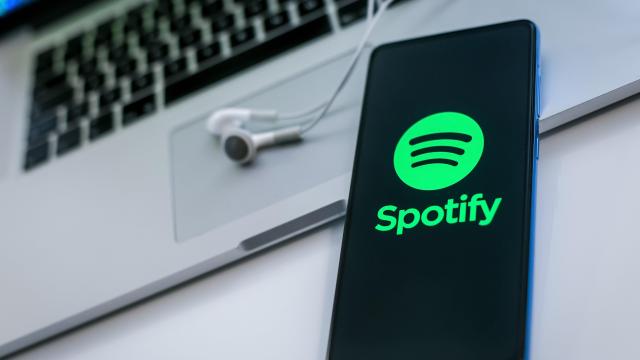Hey, you. Yeah you. You like listening to things? Listen to this. You now have access to audiobooks through Spotify. You still listening? Listen closely. At the end of the day, there’s really nothing that makes it worth listening to an audiobook on Spotify versus any other app, at least not yet.
Last November, Spotify bought out audiobook company Findaway. The company’s statements at the time hinted that Spotify might even go so far as creating audiobooks, something that could be akin to Amazon’s Audible originals.
Though in the company’s announcement post Tuesday, Spotify did not offer much more than a bare-bones service first being unleashed to the U.S. market only. Any title purchased also becomes available for download for offline listening.
The company also advertised that users can vary the pace of the audio. In a statement to Gizmodo, Spotify said the various speed options are similar to existing features found in the app that “retain quality of the audio while giving flexibility.” The company added that they are not running ads in audiobooks, at least not yet.
And that’s where features end, and there’s a lot here that makes it seem like Spotify’s initial run into audiobooks is substandard compared to competition. You can’t purchase audiobooks in the app. Clicking on a title within the Spotify mobile app instead sends you an email to a link where you can buy the audiobook on the Spotify webpage. Once you purchase the audiobook through the webpage it’s then saved to your Spotify account. Of course, it then tries to sell you on a Spotify premium subscription while it’s at it.
This is a very awkward way of doing things, especially since research shows most users are using smartphones to listen to audiobooks. It seems Spotify has not yet introduced the ability to purchase items while still in-app, and considering the competition Spotify is up against it’s a pretty big oversight.
There’s also no benefit to owning a Spotify subscription if you’re looking to get into audiobooks from Spotify. All the audiobooks up for grabs are a la carte, and only a few are discounted from their full retail price. Unlike Audible, Spotify offers no monthly subscription system similar to Audible’s premium plus subscription plan which gives users 1 credit usable on any audiobook for about $US15 ($21) a month. Audiobooks are often priced anywhere from $US20 ($28) to more than $US30 ($42).
It does seem Spotify has made a pretty good sweep of books on offer. The first set of 300,000 titles include ever-popular audio renditions of Stephen King’s Dark Tower and she-who-must-not-be-named’s Harry Potter and the Sorcerer’s Stone (the Jim Dale version, for those who stan Stephen Fry’s rendition). You can get N.K. Jemisin’s The City We Became or James S.A. Corey’s Leviathan Wakes. There’s some James Pattersons, a few Nicholas Sparks for the more — ahem “basic” among you — and classics like The Hitchhiker’s Guide to the Galaxy or Octavia Butler’s Parable of the Sower. Books also seem well-organised including selections for Black voices and LGBTQIA+ representation.
Sure, buying an audiobook on Spotify means you don’t have to swap between apps when going from podcast to something more long form, but Spotify’s latest push toward dominating the entire digital audio space seems incredibly lacklustre. The company wrote in its announcement that this is “just the first iteration” of this new service, and they plan to launch in additional markets “and innovate on the format to benefit listeners, authors, and publishers.”
And here’s the thing. You don’t have to pay for many audiobooks at all. Most libraries have partnerships with OverDrive through their Libby app. Sure, you’ll eventually lose access to the book after about a month, but do I have to say again that it’s free, and it gives a boost to your local library’s circulation records (which helps libraries when they go out seeking public and private funding). The main issue you can run into using Libby is if your local library doesn’t carry all the titles you may want.
Spotify’s rudimentary service out the starting gate isn’t anything to get too excited about. The company seems to be planning big things, at least according to past statements — but as of now, not offering anything new compared to competitors seems an odd choice for such a crowded market.
